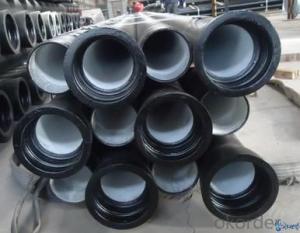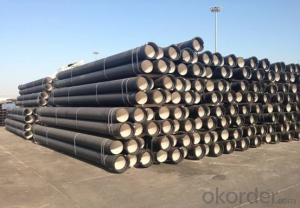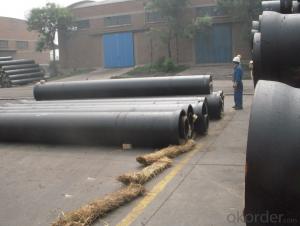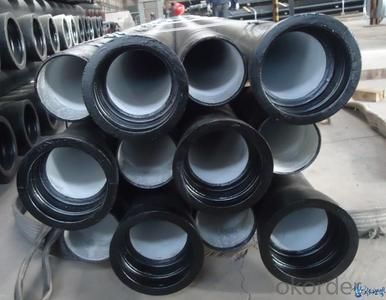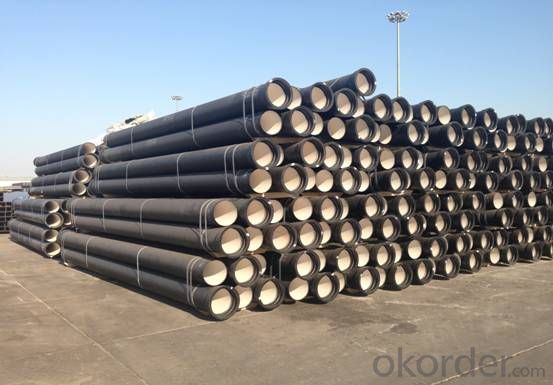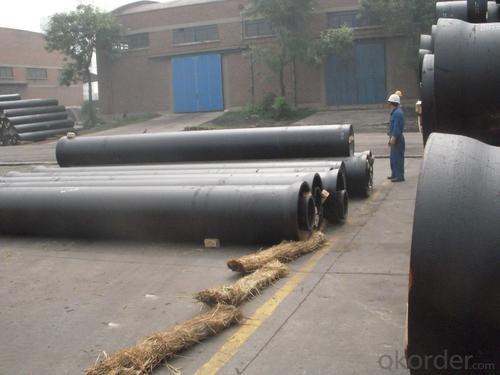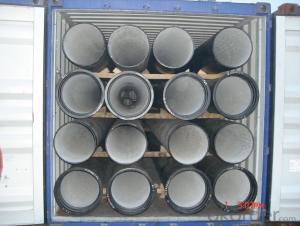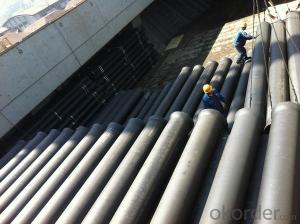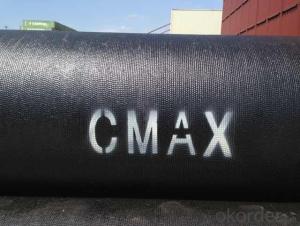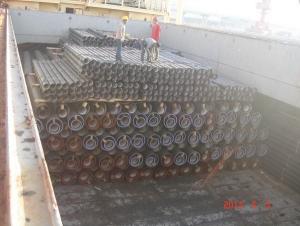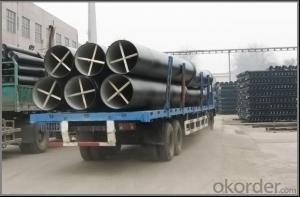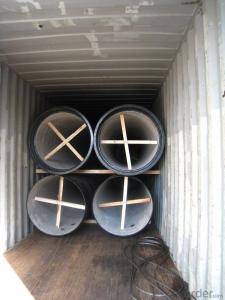DUCTILE IRON PIPES K7 DN300
- Loading Port:
- China Main Port
- Payment Terms:
- TT or LC
- Min Order Qty:
- 1 pc
- Supply Capability:
- -
OKorder Service Pledge
OKorder Financial Service
You Might Also Like
Ductile Iron Cast Pipe is without any defects compare with tradition casting tech, which has many advantages particularly as follow:
(1) High density. In the "vertical upward casting" process, the melt iron of centre liquid column in center crystallizer is continuously feeding for volume shrinkage caused by condensation tube at outer circumference , which lead to be free of shrinkage porosity.
(2) High purity. When melt iron pouring, the mixed impurities such as gas, dross, sand grain which are lighter than melt iron could be eliminated at furnace mouth, its impossible to enter into the crystallizer through the channel, so the melt iron into the crystallizer is very pure.
(3) Strength with toughness. The cooling speed provided by continuous crystallizer is 30 times than sand casting and 5 times than centrifugal casting, and doesn't produce white iron, the eutectic cell volume of continuous cast iron is one eighth to one tenth compare with traditional cast iron. The density of graphite nodule in ductile iron can reach 300-700 pcs/mm2. Therefore, all reason above improve the strength and toughness of continuous cast iron.
(4) Free machining. The high speed cooling make the hardening phase (such as boride, steadite) not appear like reticular, massive or thick, but diffuse like fish bone and pane in shape, moreover, there are tiny graphite flakes inlaid hardening phase. It's free machining in BrinellHardness the range of 250-300HB. However, the Brinell Hardness of 250 is top limit to common metal materials.
(5) High productivity. To the wall thickness of tube under 10mm, the speed of continuous casting is 1 meter/min, to the wall thickness of tube under 20mm, the speed of continuous casting is 0.5 meter/min, which is high efficiency that centrifugal or other casting tech couldn't reach.
Features of Ductile Iron Pipes:
. Ductile Iron Pipe offers proven reliability and the quality.
. It is quick and easy installation.
. The ductile iron pipe has high pressure capability.
- Q: Why is the sound speed of nodular cast iron lowered after heat treatment?
- This may be the material microstructure changes after heat treatment, is generally the pearlite content increased, the available change heat treatment and then check the corresponding microstructure and corresponding measuring sound velocity adjustment, such as annealing, normalizing etc..
- Q: What is the minimum pipe diameter of cast iron pipe?
- Nominal diameter of continuous grey cast iron pipe is 75~1200 mm, minimum 75 mm, maximum 1200 mm.
- Q: Are ductile iron pipes suitable for use in hydropower projects?
- Indeed, ductile iron pipes prove to be a suitable option for implementation in hydropower projects. Possessing a remarkable tensile strength and corrosion resistance, these pipes emerge as the ideal choice for applications in hydropower projects where water flow and pressure play a significant role. Demonstrating the ability to endure high pressure and boasting durability, these pipes guarantee long-term reliability and safety within hydropower systems. Furthermore, when compared to alternative materials such as steel, ductile iron pipes present a cost-effective solution, rendering them a favored selection for hydropower projects. In summary, ductile iron pipes possess the essential characteristics and performance qualities necessary to meet the rigorous conditions encountered in hydropower projects.
- Q: Are ductile iron pipes available in different wall thicknesses?
- Yes, ductile iron pipes are available in different wall thicknesses. Ductile iron pipes are manufactured with various wall thicknesses to meet different requirements and applications. The wall thickness of a ductile iron pipe is determined based on factors such as the pipe's diameter, the internal pressure it needs to withstand, and the soil conditions it will be installed in. Pipes with thicker walls are typically used for higher pressure applications or in areas with more challenging soil conditions, while thinner-walled pipes may be suitable for lower pressure applications. The availability of different wall thicknesses allows for flexibility in selecting the appropriate ductile iron pipe for specific projects and ensures that the pipes can efficiently and safely transport fluids or gases.
- Q: Can ductile iron pipes be used for underground mining applications?
- Yes, ductile iron pipes can be used for underground mining applications. Ductile iron is known for its strength, durability, and resistance to corrosion, making it suitable for underground mining environments where it may be exposed to harsh conditions and abrasive materials. Additionally, ductile iron pipes have excellent load-bearing capabilities, making them ideal for carrying and transporting materials in mining operations.
- Q: What is the difference between flexible joint mechanism and seismic cast iron pipe DN100 and ductile iron pipe?
- The ball compressive strength of ductile iron pipe is much higher than that of cast iron pipes, buried in the ground, the car is not easy to be crushed.
- Q: How does ductile iron pipe handle thermal expansion and contraction?
- The effectiveness of ductile iron pipe in dealing with thermal expansion and contraction is well-known. This is primarily due to its unique material properties and design characteristics. To begin with, it is worth noting that ductile iron pipe has a high coefficient of linear expansion. This means that it experiences relatively more expansion and contraction compared to other materials when exposed to temperature changes. As a result, the pipe is able to accommodate thermal expansion and contraction without causing excessive stress or deformation. Furthermore, the design of ductile iron pipes includes flexible joints. These joints, such as push-on or mechanical joints, are capable of absorbing the movement caused by thermal expansion and contraction. By providing a certain level of flexibility, these joints enable the pipe to expand and contract within a specific range without compromising its structural integrity. Additionally, the material composition of ductile iron itself plays a significant role in its ability to handle thermal expansion and contraction. Ductile iron is a type of cast iron alloy that contains nodular graphite in its microstructure. This composition provides the pipe with enhanced ductility and tensile strength. As a result, the pipe is able to withstand the stresses induced by thermal expansion and contraction without fracturing or breaking. Overall, ductile iron pipe is designed and produced in a manner that allows it to effectively deal with thermal expansion and contraction. Its high coefficient of linear expansion, flexible joints, and ductile material properties all work together to ensure that the pipe can accommodate temperature changes without causing any significant issues or structural failures.
- Q: Can ductile iron pipe be used for stormwater management systems?
- Yes, ductile iron pipe can be used for stormwater management systems. Ductile iron pipe is known for its strength, durability, and ability to withstand external loads and harsh environmental conditions, making it suitable for carrying stormwater and managing drainage systems effectively.
- Q: What is the difference between a PE fire hose and a ductile iron pipe?
- Seamless steel pipe: a pipe with a hollow cross section, used as a conduit for transporting fluids, such as pipelines for transporting petroleum, natural gas, gas, water, and certain solid materials. Compared withsteel and roundsteelinsolid, flexural torsional strength in the same time, the weight is light, is a kind of economic section steel, widely used in the manufacture of structural parts and mechanical parts, such as the oil pipe, automobile transmission shaft, the bicycle frame and steel construction with scaffold with steel pipe manufacturing ring parts can be improved the utilization rate of materials, simplify the manufacturing process, material saving and working hours, has been widely used to manufacture steel tube.
- Q: Are ductile iron pipes suitable for water distribution networks?
- Ductile iron pipes are a suitable choice for water distribution networks. They have been widely used in water distribution systems for many years, thanks to their numerous advantages. To begin with, ductile iron pipes possess excellent durability and a long lifespan. Their resistance to corrosion is crucial for water pipes since they are continuously exposed to various chemicals and substances in the water. This corrosion resistance ensures that the pipes maintain their structural integrity over time, reducing the frequency of repairs or replacements. Furthermore, ductile iron pipes have a high strength and can withstand high pressure, making them ideal for water distribution networks. They can handle heavy loads and resist external forces such as soil movement or traffic loads, guaranteeing the safety and reliability of the water supply. Moreover, ductile iron pipes exhibit excellent hydraulic properties. With their smooth internal surfaces, they minimize friction and pressure drop, enabling the efficient flow of water through the system. This aids in conserving energy and reducing pumping costs, making ductile iron pipes a cost-effective choice for water distribution networks. Additionally, ductile iron pipes are versatile and can be easily installed in various soil conditions. They can endure ground movement and settle without breaking, which is crucial for maintaining a stable water distribution system. In conclusion, ductile iron pipes are highly suitable for water distribution networks due to their durability, resistance to corrosion, high strength, excellent hydraulic properties, and versatility in installation. They offer a reliable and efficient solution for delivering safe and clean water to communities.
Send your message to us
DUCTILE IRON PIPES K7 DN300
- Loading Port:
- China Main Port
- Payment Terms:
- TT or LC
- Min Order Qty:
- 1 pc
- Supply Capability:
- -
OKorder Service Pledge
OKorder Financial Service
Similar products
Hot products
Hot Searches
Related keywords
